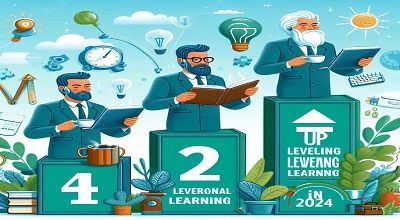Tips for Leveling Up Professional Learning
Tips for Leveling Up Professional Learning: Professional learning is essential for educators seeking to enhance their teaching strategies and stay updated with the latest trends. As we step into 2025, the landscape of professional development is rapidly evolving. Here are three actionable tips to help educators level up their professional learning this year.
Embrace Technology-Enhanced Learning
Integrating Online Platforms
The rise of online learning platforms has transformed professional development. Educators can access a wealth of resources, including webinars, courses, and digital conferences, from anywhere in the world. Platforms like Coursera and edX offer courses tailored to educators that cover various topics from classroom management to innovative teaching techniques.
Utilizing Learning Management Systems (LMS)
Implementing an LMS can streamline professional development. These systems allow educators to track their progress, engage in collaborative projects, and access a variety of learning materials. Teachers can benefit from personalized learning paths tailored to their individual goals, fostering a more engaging and effective learning experience.
Gamification of Learning
Gamification introduces elements of game design to learning experiences, making professional development more engaging. Incorporating badges, leaderboards, and rewards can motivate educators to complete courses and engage with content actively. This approach fosters a sense of community and healthy competition among educators.
Foster Collaborative Learning Environments
Building Professional Learning Communities (PLCs)
Creating PLCs encourages collaboration among educators. These communities provide a platform for sharing best practices, resources, and feedback. Regular meetings can facilitate discussions around challenges and successes, enhancing collective knowledge and skills. Leveraging social media groups can also expand these communities beyond local boundaries.
Mentorship Programs
Establishing mentorship programs can greatly enhance professional learning. Pairing novice educators with experienced mentors allows for knowledge transfer and personalized support. Mentors can provide insights on classroom management, curriculum design, and navigating school policies, fostering a culture of continuous growth and development.
Peer Observation
Encouraging peer observation is another effective strategy. Educators can observe each other’s classrooms to gain new perspectives and teaching strategies. This practice promotes reflective teaching and allows educators to learn from one another’s experiences, enhancing their instructional techniques.
Prioritize Reflective Practices
Setting Personal Learning Goals
Educators should set specific, measurable, achievable, relevant, and time-bound (SMART) goals for their professional learning. Regularly reviewing these goals can help track progress and motivate ongoing development. Utilizing reflective journals can assist in documenting insights and experiences throughout the learning journey.
Engaging in Self-Assessment
Self-assessment encourages educators to evaluate their teaching practices critically. Tools like rubrics and checklists can help identify strengths and areas for improvement. This process not only fosters self-awareness but also drives targeted professional development efforts.
Seeking Feedback
Feedback is crucial for growth. Educators should actively seek constructive feedback from peers, students, and administrators. This feedback can provide valuable insights into their teaching effectiveness and guide professional learning pursuits.
FAQs
1. What are Professional Learning Communities (PLCs)?
Answer: PLCs are groups of educators that meet regularly to share expertise, collaborate on teaching strategies, and support each other’s professional growth.
2. How can technology enhance professional learning?
Answer: Technology provides access to online courses, resources, and platforms that facilitate collaborative learning and enable personalized professional development.
3. What is gamification in professional learning?
Answer: Gamification applies game design elements to learning environments to increase engagement and motivation among educators.
4. Why is reflective practice important for educators?
Answer: Reflective practice helps educators critically assess their teaching, set personal goals, and identify areas for improvement, fostering continuous growth.
5. How can educators find mentors?
Answer: Educators can seek mentors through school networks, professional organizations, or by participating in mentorship programs.
6. What role does feedback play in professional learning?
Answer: Feedback provides insights into teaching effectiveness, helping educators identify strengths and areas for improvement in their practice.
Conclusion
As we move forward in 2025, educators must adapt their professional learning strategies to foster growth and innovation. By embracing technology, fostering collaboration, and prioritizing reflective practices, educators can enhance their professional development experiences, ultimately leading to better outcomes for their students.
